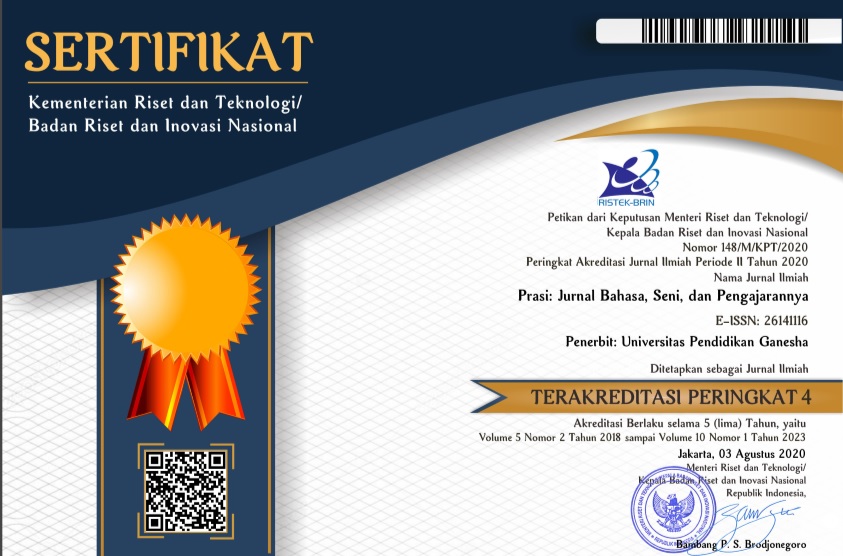NOMINA DERIVASIONAL BAHASA JEPANG : SEBUAH KAJIAN MORFOLOGI GENERATIF
DOI:
https://doi.org/10.23887/prasi.v10i20.8915Abstract
Affixation is one of word formations found in most languages including in Japanese. Word formation which changes lexical identity and resulted a new lexicon is called derivation. This study was conducted to determine the process of derivational noun formation in Japanese. The results of this study show that (1) the process of the formation of Japanese noun derivational is done by embedding derivational affixes to the root of verbs, nouns, and adjectives, such as prefix{su-, ma-} suffixes {-mamire, -darake, -sei,-te, -tate, -gachi-Gimi,-sa, -mi, -Me, sei} (2) there are forms which are appropriate according to word formation rules but are not used in Japanese due to blocking of other forms representing the word.e.g *utaite, *nomitate. Afixation process in the formation of noun derivational resulted morphophonemic. Phonological processes that take place between them are the assimilation of consonant and vowel insertion / i / at the root of verbs that end in a consonant.
Keywords : derivation, blocking, word formation
Downloads
Published
Issue
Section
License
Authors who publish with Prasi agree to the following terms:- Authors retain copyright and grant the journal the right of first publication with the work simultaneously licensed under a Creative Commons Attribution License (CC BY-SA 4.0) that allows others to share the work with an acknowledgment of the work's authorship and initial publication in this journal
- Authors are able to enter into separate, additional contractual arrangements for the non-exclusive distribution of the journal's published version of the work (e.g., post it to an institutional repository or publish it in a book), with an acknowledgment of its initial publication in this journal.
- Authors are permitted and encouraged to post their work online (e.g., in institutional repositories or on their website) prior to and during the submission process, as it can lead to productive exchanges, as well as earlier and greater citation of published work. (See The Effect of Open Access)


.png)
.png)









